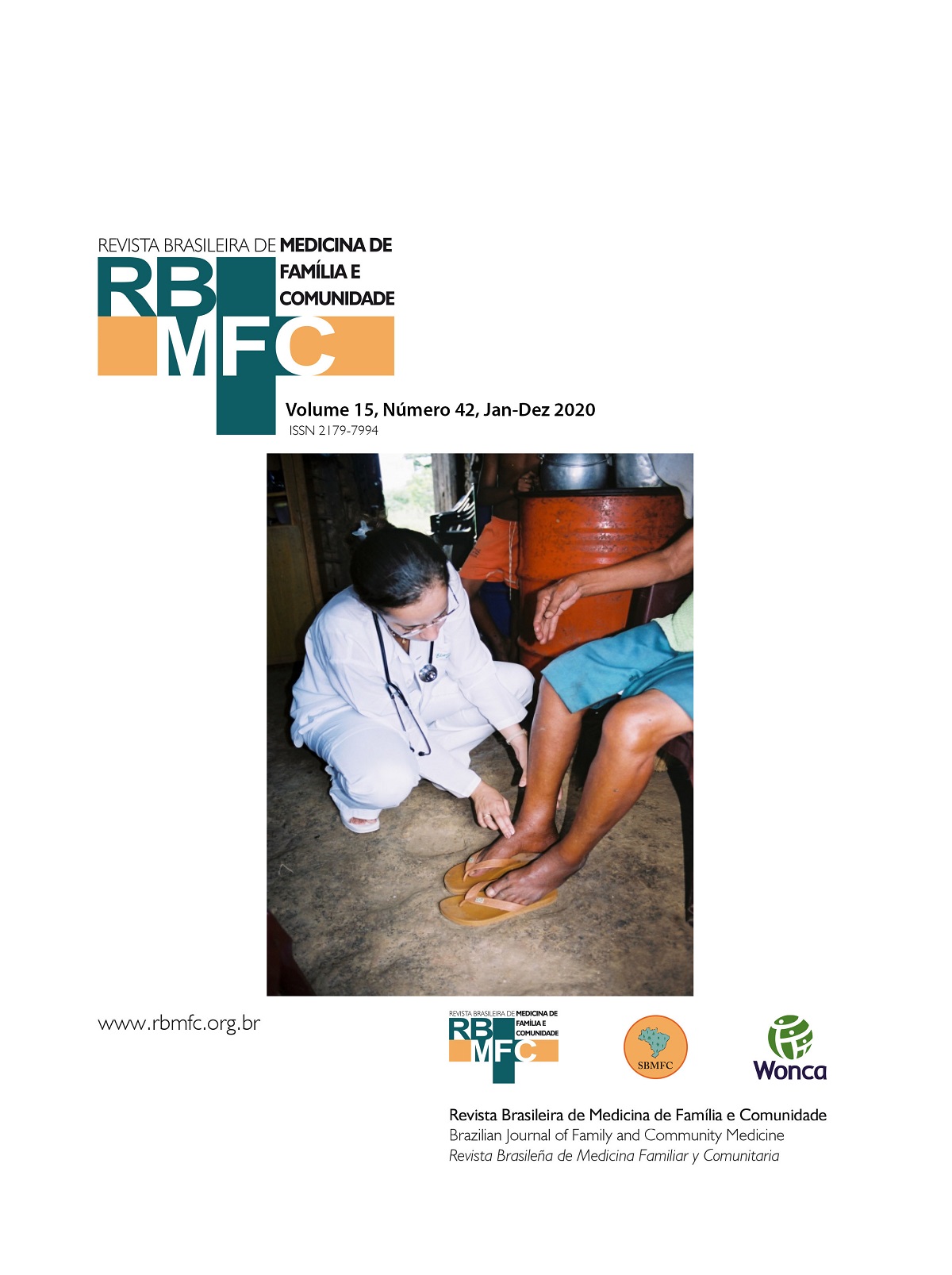Investigar para qué?
DOI:
https://doi.org/10.5712/rbmfc15(42)2369Palabras clave:
Investigación, Proyectos de Investigación, Comunicación Académica, Preimpresión, Técnicas de InvestigaciónResumen
Para contribuir a la atención primaria de salud, la investigación en medicina familiar y comunitaria debe evitar cuatro factores que han llevado a la pérdida de investigación biomédica en todo el mundo: preguntas de investigación irrelevantes; métodos inadecuados para lograr los objetivos de investigación; lentitud y publicación inadecuada de resultados; oscuridad e falta de transparencia del informe de investigación. En este editorial, presentamos medidas para que los autores garanticen
el impacto de su investigación, y presentamos nuevas políticas editoriales de RBMFC
Descargas
Métricas
Citas
Maeseneer JMD, Sutter AD. Why Research in Family Medicine? A Superfluous Question. Ann Fam Med. 2004;2(suppl 2):S17–22. https://doi.org/10.1370/afm.148 DOI: https://doi.org/10.1370/afm.148
Chalmers I, Glasziou P. Avoidable waste in the production and reporting of research evidence. Lancet. 2009;374(9683):86–9. https://doi.org/10.1016/S0140-6736(09)60329-9 DOI: https://doi.org/10.1016/S0140-6736(09)60329-9
Glasziou P, Chalmers I. Research waste is still a scandal—an essay by Paul Glasziou and Iain Chalmers. BMJ. 2018;363:k4645. https://doi.org/10.1136/bmj.k4645 DOI: https://doi.org/10.1136/bmj.k4645
Green LW. Making research relevant: if it is an evidence-based practice, where’s the practice-based evidence? Fam Pract.2008;25(suppl_1):i20–4. https://doi.org/10.1093/fampra/cmn055 DOI: https://doi.org/10.1093/fampra/cmn055
Orlandin EAS, Moscovici L, Franzon ACA, Passos ADC, Fabbro ALD, Vieira EM, et al. Uma agenda de pesquisa para a Atenção Primária à Saúde no estado de São Paulo, Brasil: o estudo ELECT. Interface - Comun Saúde Educ. 2017;21(61):349–61. https://doi.org/10.1590/1807-57622016.0103 DOI: https://doi.org/10.1590/1807-57622016.0103
MacFarlane A, Galvin R, O’Sullivan M, McInerney C, Meagher E, Burke D, et al. Participatory methods for research prioritization in primary care: an analysis of the World Café approach in Ireland and the USA. Fam Pract. 2017;34(3):278–84. https://doi.org/10.1093/fampra/cmw104 DOI: https://doi.org/10.1093/fampra/cmw104
O’Neill B, Aversa V, Rouleau K, Lazare K, Sullivan F, Persaud N. Identifying top 10 primary care research priorities from international stakeholders using a modified Delphi method. PLOS ONE. 2018;13(10):e0206096. https://doi.org/10.1371/journal.pone.0206096 DOI: https://doi.org/10.1371/journal.pone.0206096
Crocker JC, Ricci-Cabello I, Parker A, Hirst JA, Chant A, Petit-Zeman S, et al. Impact of patient and public involvement on enrolment and retention in clinical trials: systematic review and meta-analysis. BMJ. 2018;363:k4738. https://doi.org/10.1136/bmj.k4738 DOI: https://doi.org/10.1136/bmj.k4738
Nyanchoka L, Tudur-Smith C, Thu VN, Iversen V, Tricco AC, Porcher R. A scoping review describes methods used to identify, prioritize and display gaps in health research. J Clin Epidemiol. 2019;109:99–110. https://doi.org/10.1016/j.jclinepi.2019.01.005 DOI: https://doi.org/10.1016/j.jclinepi.2019.01.005
Greenhalgh T, Hinton L, Finlay T, Macfarlane A, Fahy N, Clyde B, et al. Frameworks for supporting patient and public involvement in research: Systematic review and co‐design pilot. Health Expect Int J Public Particip Health Care Health Policy. 2019;22(4):785–801. https://doi.org/10.1111/hex.12888 DOI: https://doi.org/10.1111/hex.12888
Ioannidis JPA, Greenland S, Hlatky MA, Khoury MJ, Macleod MR, Moher D, et al. Increasing value and reducing waste in research design, conduct, and analysis. Lancet. 2014;383(9912):166–75. https://doi.org/10.1016/S0140-6736(13)62227-8 DOI: https://doi.org/10.1016/S0140-6736(13)62227-8
Chan A-W, Song F, Vickers A, Jefferson T, Dickersin K, Gøtzsche PC, et al. Increasing value and reducing waste: addressing inaccessible research. Lancet. 2014;383(9913):257–66. https://doi.org/10.1016/S0140-6736(13)62296-5 DOI: https://doi.org/10.1016/S0140-6736(13)62296-5
Brown T. It’s time for AllTrials registered and reported. Cochrane Database Syst Rev. 2013;(4):ED000057. https://doi.org/10.1002/14651858.ED000057 DOI: https://doi.org/10.1002/14651858.ED000057
Oakden-Rayner L, Beam AL, Palmer LJ. Medical journals should embrace preprints to address the reproducibility crisis. Int J Epidemiol.2018;47(5):1363–5. https://doi.org/10.1093/ije/dyy105 DOI: https://doi.org/10.1093/ije/dyy105
Peiperl L, on behalf of the PLOS Medicine Editors. Preprints in medical research: Progress and principles. PLOS Med. 2018;15(4):e1002563. https://doi.org/10.1371/journal.pmed.1002563 DOI: https://doi.org/10.1371/journal.pmed.1002563
Rawlinson C, Bloom T. New preprint server for medical research. BMJ. 2019;365:l2301. https://doi.org/10.1136/bmj.l2301 DOI: https://doi.org/10.1136/bmj.l2301
Davis PM. Open access, readership, citations: a randomized controlled trial of scientific journal publishing. FASEB J Off Publ Fed Am Soc Exp Biol. 2011;25(7):2129–34. https://doi.org/10.1096/fj.11-183988 DOI: https://doi.org/10.1096/fj.11-183988
Davis PM, Lewenstein BV, Simon DH, Booth JG, Connolly MJL. Open access publishing, article downloads, and citations: randomised controlled trial. BMJ. 2008;337:a568. https://doi.org/10.1136/bmj.a568 DOI: https://doi.org/10.1136/bmj.a568
Gunaratne K, Haghbayan H, Coomes EA. Tweeting Authors: Impact on Research Publicity and Downstream Citations. J Gen Intern Med. 2019; https://doi.org/10.1007/s11606-019-05454-0 DOI: https://doi.org/10.1007/s11606-019-05454-0
Taylor J. Reporting research findings to participants is an ethical imperative. BMJ. 2019;367:l6324. https://doi.org/10.1136/bmj.l6324 DOI: https://doi.org/10.1136/bmj.l6324
Glasziou P, Altman DG, Bossuyt P, Boutron I, Clarke M, Julious S, et al. Reducing waste from incomplete or unusable reports of biomedical research. Lancet. 2014;383(9913):267–76. https://doi.org/10.1016/S0140-6736(13)62228-X DOI: https://doi.org/10.1016/S0140-6736(13)62228-X
Wilkinson MD, Dumontier M, Aalbersberg IjJ, Appleton G, Axton M, Baak A, et al. The FAIR Guiding Principles for scientific data management and stewardship. Sci Data. 2016;3:160018. https://doi.org/10.1038/sdata.2016.18 DOI: https://doi.org/10.1038/sdata.2016.18
Chauvette A, Schick-Makaroff K, Molzahn AE. Open Data in Qualitative Research. Int J Qual Methods. 2019;18:1609406918823863. https://doi.org/10.1177/1609406918823863 DOI: https://doi.org/10.1177/1609406918823863
Descargas
Publicado
Cómo citar
Número
Sección
Licencia
Al enviar un manuscrito al RBMFC, los autores conservan la propiedad de los derechos de autor del artículo y autorizan a RBMFC a publicar ese manuscrito bajo la licencia Creative Commons Attribution 4.0 e identificarse como el vehículo de su publicación original.















